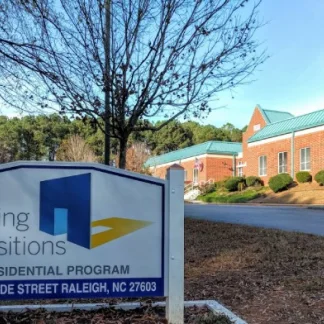Cottage Home Care
Cottage Home Care is a private rehab located in Raleigh, North Carolina. Cottage...
Healing Transitions – Mens Campus can be found in Raleigh, NC, and is a substance abuse treatment center that provides help to individuals seeking drug and alcohol recovery. This drug rehab center utilizes a peer run social model recovery program. It is also free for those who are homeless or uninsured.
At Healing Transitions – Mens Campus, innovative peer based recovery oriented services are offered to uninsured and underserved individuals with drug and alcohol addiction problems. Each of the programs provided by Healing Transitions Mens Campus is designed to rekindle a person’s ability and desire to return to a sober lifestyle. Below, each of the programs offered is detailed:
Those involved in the long term residential inpatient recovery program are responsible for the daily operations on campus. This residential treatment program focuses on peer accountability and encourages individuals to complete Recovery Dynamic sessions.
In addition to this, individuals complete life skills classes and job readiness alongside individual and group counseling centering on drug and alcohol recovery.
The non-medicated detox program at this addiction treatment center provides clients with treatment 24 hours a day, seven days a week. This program offers individuals a safe environment to detox, with staff helping each person manage their drug and alcohol cravings and withdrawal symptoms.
During this program, individuals are given the substance abuse recovery resources they need to help them find and maintain sobriety.
Contact us for more information: (919) 838-9800

Connect with Healing Transitions - Men Campus by calling their admissions team directly.
(919) 838-9800 Website Get DirectionsResearch clearly demonstrates that recovery is far more successful and sustainable when loved ones like family members participate in rehab and substance abuse treatment. Genetic factors may be at play when it comes to drug and alcohol addiction, as well as mental health issues. Family dynamics often play a critical role in addiction triggers, and if properly educated, family members can be a strong source of support when it comes to rehabilitation.
Group therapy is any therapeutic work that happens in a group (not one-on-one). There are a number of different group therapy modalities, including support groups, experiential therapy, psycho-education, and more. Group therapy involves treatment as well as processing interaction between group members.
In individual therapy, a patient meets one-on-one with a trained psychologist or counselor. Therapy is a pivotal part of effective substance abuse treatment, as it often covers root causes of addiction, including challenges faced by the patient in their social, family, and work/school life.
Group therapy is any therapeutic work that happens in a group (not one-on-one). There are a number of different group therapy modalities, including support groups, experiential therapy, psycho-education, and more. Group therapy involves treatment as well as processing interaction between group members.
In individual therapy, a patient meets one-on-one with a trained psychologist or counselor. Therapy is a pivotal part of effective substance abuse treatment, as it often covers root causes of addiction, including challenges faced by the patient in their social, family, and work/school life.
In individual therapy, a patient meets one-on-one with a trained psychologist or counselor. Therapy is a pivotal part of effective substance abuse treatment, as it often covers root causes of addiction, including challenges faced by the patient in their social, family, and work/school life.
Cottage Home Care is a private rehab located in Raleigh, North Carolina. Cottage...
Custom Home Care and Rehabilitation is a private rehab located in Raleigh, North...
Alcoholics Anonymous is an international fellowship of men and women who have ha...
Southlight Healthcare - Garner Road offers alcohol and drug rehab services to in...